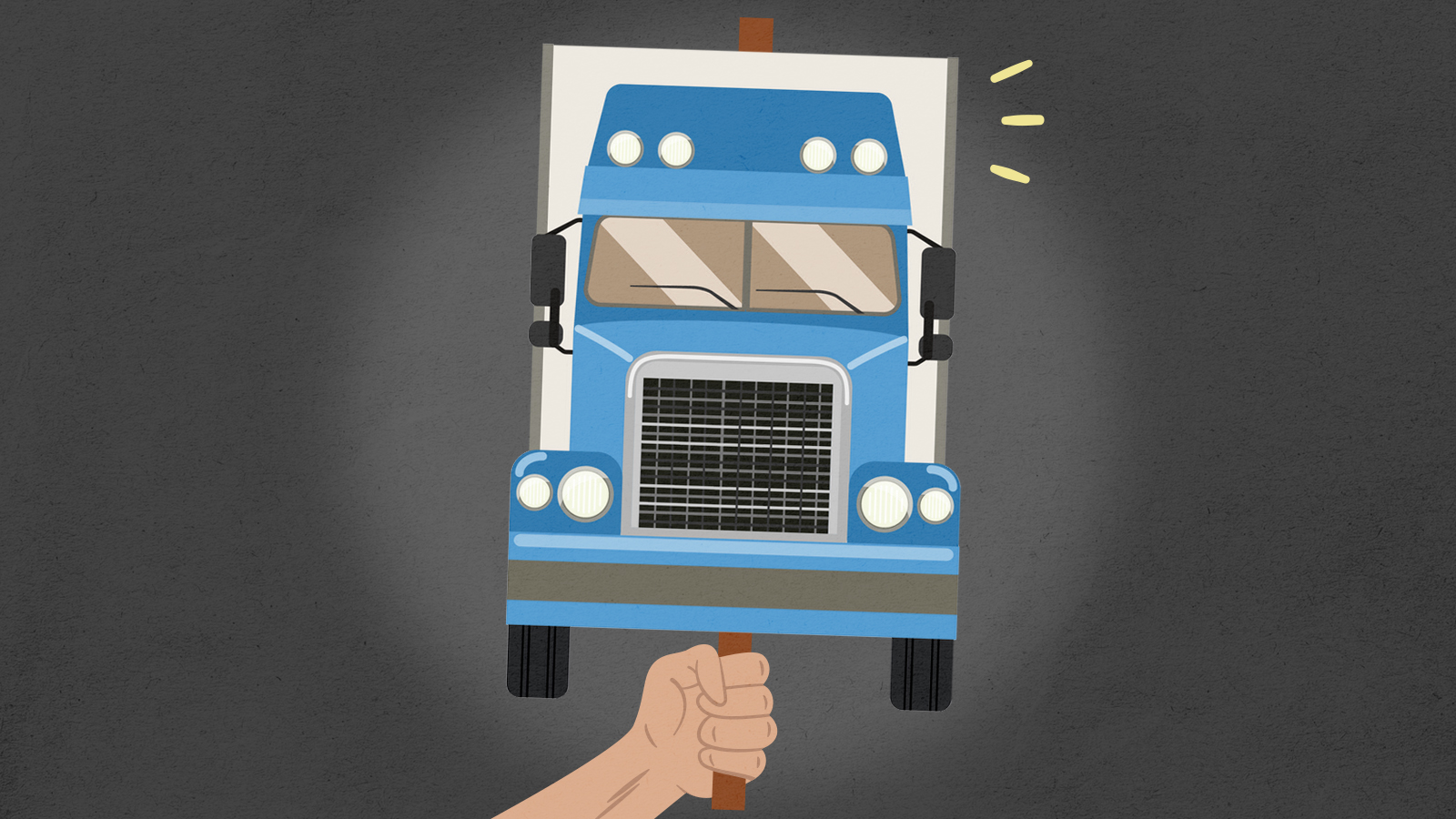How Canada's Freedom Convoy could be a wake-up call for the Teamsters
Will the next great trucker protest be by UPS workers?


A free daily email with the biggest news stories of the day – and the best features from TheWeek.com
You are now subscribed
Your newsletter sign-up was successful
This week, a "People's Convoy" of truckers aggrieved by COVID-19 restrictions and vaccine mandates will descend upon the metropolitan Washington, D.C., area with a goal of blockading economic activity in the nation's capital. The American convoy models itself off similar trucker demonstrations in Ottawa, which were able to temporarily shut down over a quarter of the daily trade between the U.S. and Canada.
One protest organizer, Bob Bolus, told D.C.'s Fox 5 News that he analogizes the goal of the Washington convoy to "a giant boa constrictor that basically squeezes you, chokes you, and … swallows you, and that's what we're going to do the D.C. [region]." Residents of the area are understandably nervous about another large group of conservative protesters coming in from out of town with the goal of shutting things down.
There is, however, another group that might be watching the D.C. convoy closely: the union representing 1.4 million truck drivers and other logistics workers, the International Brotherhood of Teamsters.
The Week
Escape your echo chamber. Get the facts behind the news, plus analysis from multiple perspectives.

Sign up for The Week's Free Newsletters
From our morning news briefing to a weekly Good News Newsletter, get the best of The Week delivered directly to your inbox.
From our morning news briefing to a weekly Good News Newsletter, get the best of The Week delivered directly to your inbox.
The Teamsters have come out strongly against the convoys, calling them a "disruption" and a threat to the livelihood of working Americans. But within the union, many are hoping truckers will soon cause more disruption. Sasha, a UPS Teamster working out of Oakland, California, recently had her pay cut by almost 25 percent under a contract loophole that permits the company to roll back higher wages that were offered to new part-time hires during the pandemic. She recalled to The Week a conversation with one of her coworkers who is raising a child and told her that he had been proud to be a UPS worker, but that with the pay cut the choice for him was either "to quit, or to fight." Sasha has told her friends, only partially in jest, that they should expect Christmas to be canceled in 2023 if the company doesn't meet their demands — and she relayed that the workers she knows are "excited about the prospect of more militant action," especially since the pay cuts.
The Teamsters are the largest private-sector union in the United States. With the retirement of General President Jimmy Hoffa — son of the more famous late president of the same name — the union has elected Sean O'Brien at the head of an uneasy coalition between longstanding Hoffa critics (including the reform-minded Teamsters for a Democratic Union, of which Sasha is a member) and recent defectors from Hoffa's faction, many of whom were angered by a 2018 decision by the previous leadership to impose a contract on 250,000 UPS workers despite a majority voting against ratification. The candidate backed by Hoffa, Steve Vairma, received just one-third of the vote in last year's election, while O'Brien, who defected from Hoffa's faction over his opposition to the UPS contract move, received two-thirds. O'Brien will take office next month.
While Teamster politics have long been contentious and there are multiple reasons for the shift in leadership, O'Brien and his coalition tapped into a sentiment that the union needs to be more aggressive in bargaining and willing to support strikes. The new leader's agenda includes a promise to involve rank-and-file members on bargaining teams and, crucially, to pay out strike benefits beginning on day one, reversing a policy that had workers go without pay for over a week before the union's strike fund provided them with relief — a policy that O'Brien and allies argue undermines the threat of strikes as bargaining leverage.
The UPS contract expires in 2023, giving the union an opportunity for a do-over on issues such as two-tier pay structures, forced overtime, and harassment by supervisors at a company that increased its operating profits by over 50 percent in 2021. The big question for workers and their union is, how far are they willing to go to end these practices and win better pay and conditions?
A free daily email with the biggest news stories of the day – and the best features from TheWeek.com
The new leadership, elected on pledges to drive a harder bargain and to prepare the union for a strike if necessary, could simply do these things with the intention of achieving a better deal at the last minute, averting a strike. The IATSE union, representing film and television production staff, used this tactic to win concessions from studios, authorizing a strike with 98 percent voting in favor at a 90 percent turnout, then cutting a controversial deal passed only by slim majorities within the union.
However, this is not the only option. Teamsters might like their chances in a strike against UPS, especially as memories will be fresh from the disruptions caused by trucker convoys, organized without strike pay or legal protection from a pro-union National Labor Relations Board. Workers would likely have political support from the Biden administration, and the sky-high profits reported by UPS may work against the company due to the sentiment that they can afford to give workers a better deal. Sasha, the California Teamster, says that this is "common sense" with her community when she talks about the issues and notes Americans supported the last UPS strike in 1997, which won part-time workers like her healthcare benefits, among other victories.
The trucker convoy protests have little to do with traditional labor issues, and lots of Teamsters view them with disdain; many of those participating in the protests are nonunion owner-operators. The Ottawa convoy's target is not the boss, but an elected federal government with an incentive to project strength by rejecting demands of a group that are damaging the economy. The disruption caused by the trucker protests was not sufficient to force the Canadian government into serious concessions, and they're even less likely to do so in D.C.
The Teamsters facing off against UPS, on the other hand, have better odds. The union is unlikely to officially support blockades due to potential liability, but legal mass pickets and community campaigns are likely, and it is possible to imagine some truckers (indeed, possibly some of the same truckers — there are, Sasha notes, labor unionists of all races, genders, and political orientations) taking matters into their own hands and shutting down access to major shipping corridors. With the union withdrawing its labor, militant disruptions, and public sympathy, the company could be forced into major concessions.
Anyone hoping that the trucker convoys will turn into a durable expression of working-class power is deluding themselves, whether they be naive leftists who see a revolution around every corner, or conservative populists offering ludicrous pronouncements about the Republican Party being a "workers' party." But history sometimes takes strange courses, and it is possible to imagine that this display of economic disruption by anti-mandate truckers in Canada and the United States could be remembered as a wake-up call for labor.
Saoirse Gowan is a writer and researcher with a focus on public policy from a left perspective. She was born and raised in Ireland by an American mother and Irish father, and moved to Washington, D.C. in 2018. She currently lives in Hyattsville, MD, and spends her free time on art and dancing.
-
 Trump’s fuel blockade puts Cuba in crisis mode
Trump’s fuel blockade puts Cuba in crisis modeIN THE SPOTLIGHT Plummeting tourism, scrambling airlines and rolling blackouts are pushing Cuban society to the brink
-
 ‘The mark’s significance is psychological, if that’
‘The mark’s significance is psychological, if that’Instant Opinion Opinion, comment and editorials of the day
-
 How did ‘wine moms’ become the face of anti-ICE protests?
How did ‘wine moms’ become the face of anti-ICE protests?Today’s Big Question Women lead the resistance to Trump’s deportations
-
 Buffett: The end of a golden era for Berkshire Hathaway
Buffett: The end of a golden era for Berkshire HathawayFeature After 60 years, the Oracle of Omaha retires
-
 Tariffs have American whiskey distillers on the rocks
Tariffs have American whiskey distillers on the rocksIn the Spotlight Jim Beam is the latest brand to feel the pain
-
 TikTok secures deal to remain in US
TikTok secures deal to remain in USSpeed Read ByteDance will form a US version of the popular video-sharing platform
-
 SiriusXM hopes a new Howard Stern deal can turn its fortunes around
SiriusXM hopes a new Howard Stern deal can turn its fortunes aroundThe Explainer The company has been steadily losing subscribers
-
 How will the Warner Bros. bidding war affect the entertainment industry?
How will the Warner Bros. bidding war affect the entertainment industry?Today’s Big Question Both Netflix and Paramount are trying to purchase the company
-
 Texas is trying to become America’s next financial hub
Texas is trying to become America’s next financial hubIn the Spotlight The Lone Star State could soon have three major stock exchanges
-
 US mints final penny after 232-year run
US mints final penny after 232-year runSpeed Read Production of the one-cent coin has ended
-
 How could worsening consumer sentiment affect the economy?
How could worsening consumer sentiment affect the economy?Today’s Big Question Sentiment dropped this month to a near-record low
